Why Mortuary Science Courses Are Essential for Death Care Professionals
Mortuary science courses provide the comprehensive education needed to serve families during their most difficult times. These specialized programs combine technical skills like embalming and restorative art with business management, legal knowledge, and grief counseling to prepare students for careers in funeral service.
Core mortuary science course categories include:
- Embalming and Restorative Art - Hands-on training in body preparation and cosmetic restoration
- Funeral Service Operations - Business management, merchandising, and funeral directing
- Legal and Ethical Studies - Mortuary law, professional ethics, and regulatory compliance
- Applied Sciences - Anatomy, microbiology, pathology, and thanatochemistry
- Psychology and Counseling - Grief support, communication skills, and bereavement care
Most programs require 60-120 credit hours and include both classroom instruction and practical laboratory experience. Students can choose from in-person, online, or hybrid learning formats to fit their schedules. Accredited programs prepare graduates for state licensing exams and National Board Examinations.
"A career working in a funeral home or crematory can be very rewarding; however, it requires a unique combination of interpersonal skills, intellect, and business acumen."
Career opportunities include funeral director, embalmer, funeral service manager, and mortician, with salaries ranging from $26,000 to $126,000 annually. The field offers strong job security with a 100% employment rate reported by many programs.
I'm Mortuary Cooler, a national-level mortuary equipment supplier with extensive experience serving funeral homes across America. My background includes working closely with funeral directors and mortuary science educators to understand the practical equipment needs that support quality mortuary science courses and professional training programs.
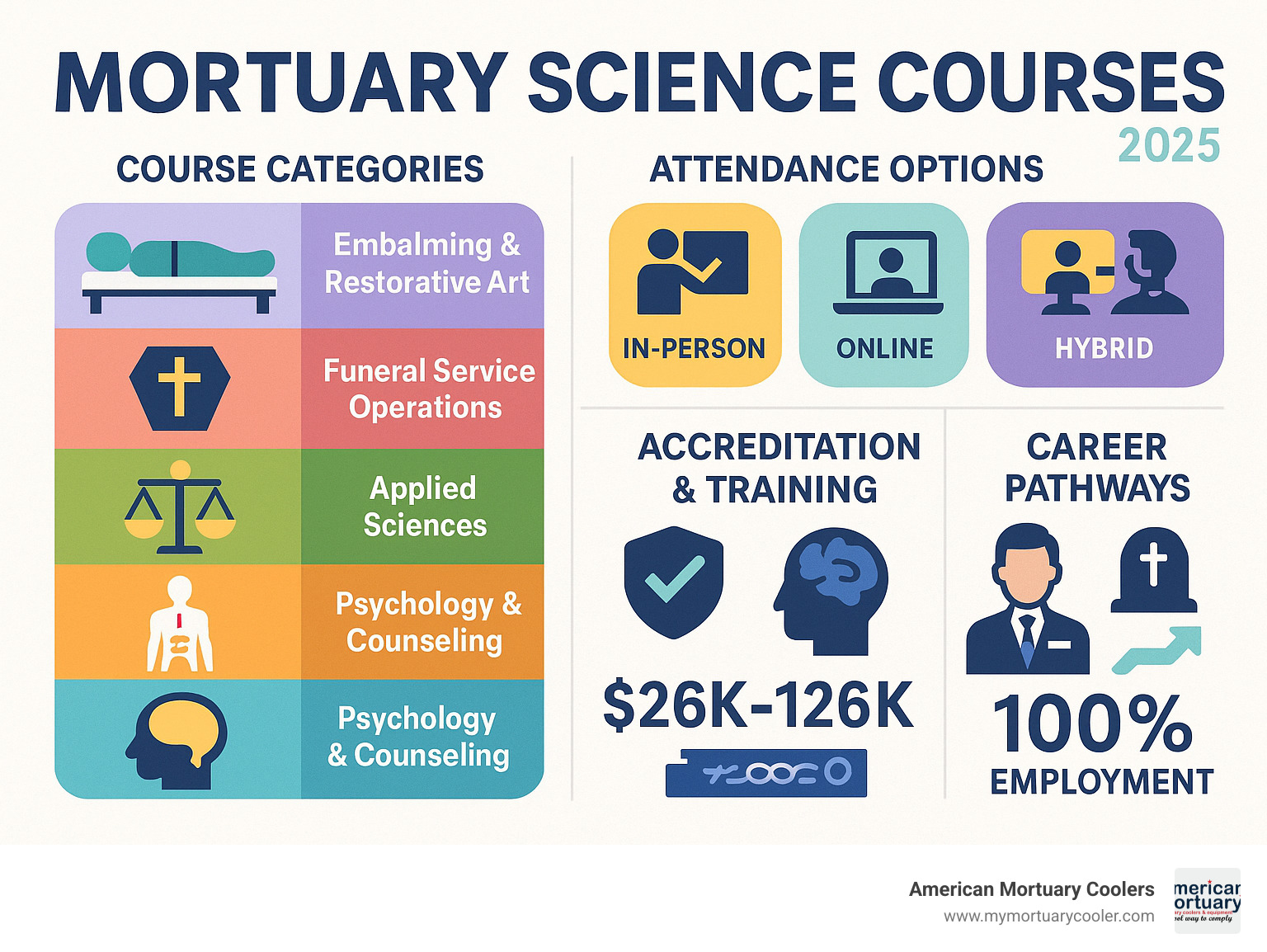
Related content about mortuary science courses:
Understanding Mortuary Science: Scope and Significance
Mortuary science combines science, art, and human compassion to serve communities during their most difficult times. Mortuary science courses prepare students to become trusted guides who help families steer grief while honoring their loved ones.
The field encompasses diverse responsibilities including understanding cultural practices from various communities, handling public health considerations, navigating complex legal requirements, and managing business operations - all while providing emotional support to grieving families.
According to the National Funeral Directors Association, funeral directors "provide support to the bereaved during initial stages of their grief, arrange and direct funeral ceremonies, arrange for removal of the deceased from the place of death, and prepare the body according to the wishes of the survivors and requirements of the law."
What makes this field unique is how it combines hard science with soft skills. One moment you're applying chemistry knowledge for embalming procedures, the next you're offering grief support to a heartbroken spouse.
The death care industry continues evolving with changing consumer preferences, yet the heart of the profession remains unchanged - serving communities with dignity, respect, and genuine care. Quality mortuary science courses prepare the next generation to meet these complex challenges while maintaining the highest standards of care.
Typical Mortuary Science Courses
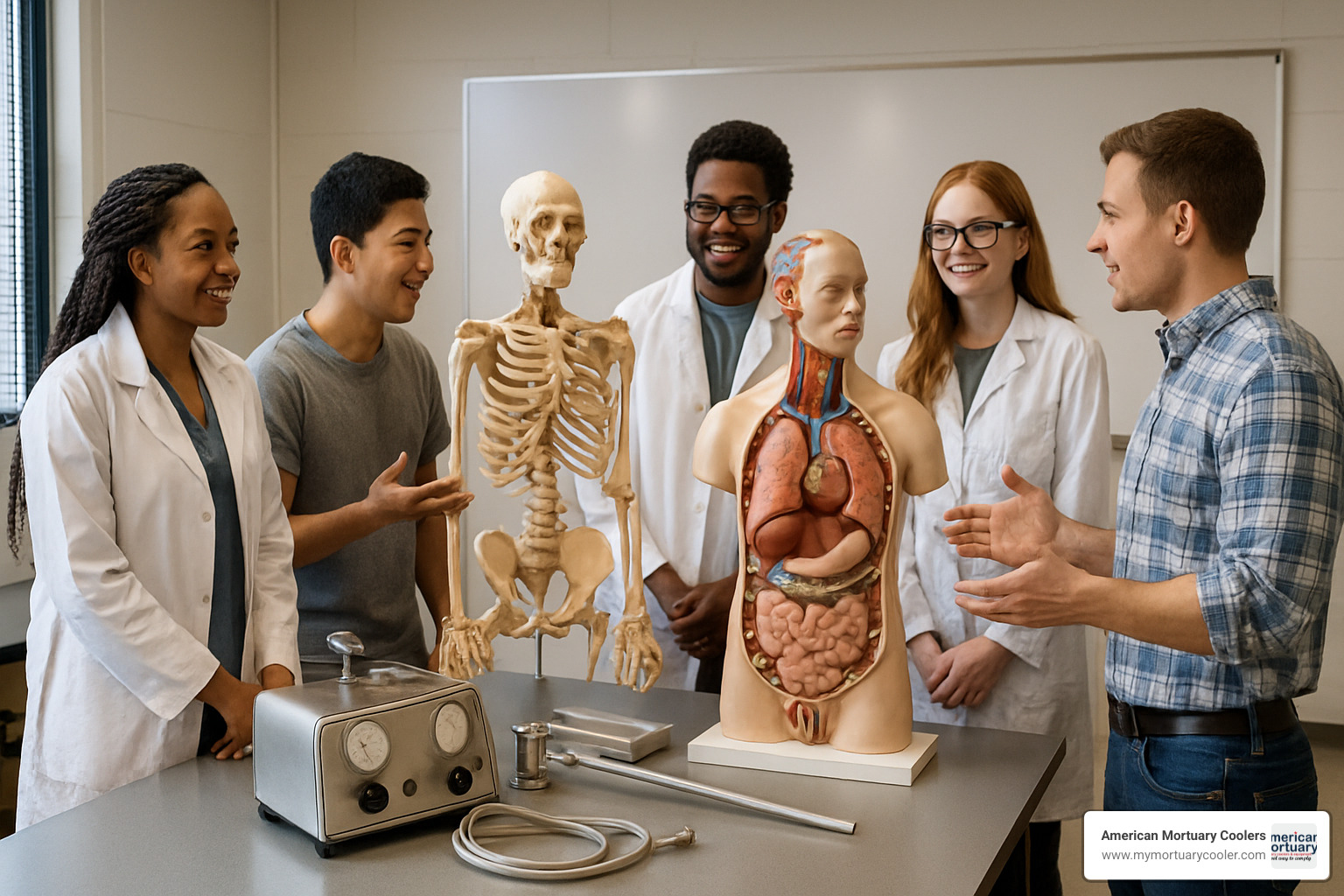
Mortuary science courses are thoughtfully designed to provide both technical skills and compassionate understanding needed to serve families during difficult times. Most accredited programs require 60-120 credit hours, blending scientific knowledge with business skills and human psychology.
Core foundation courses include Funeral Orientation and History, Anatomy for Mortuary Science (typically three courses), and hands-on Embalming Theory and Practice with corresponding laboratory sessions. Restorative Art courses teach the delicate skills needed to help families say goodbye with dignity.
Business preparation covers Funeral Directing, Funeral Home Management and Accounting, and Marketing and Merchandising. Legal foundation includes Mortuary Law and Ethics and Federal Trade Commission Regulations.
Scientific understanding builds through Microbiology and Pathology, Thanatochemistry, and Public Health and Sanitation. Human connection skills develop through Psychology of Death and Dying and Grief Counseling.
Practical application happens through Practicum Experience in real funeral home settings under supervision, plus Methods of Disposition covering burial and cremation practices.
Embalming and Restorative Art Training
Embalming education begins with theory covering history, legal requirements, and safety. Students learn embalming chemistry, proper dilution ratios, and chemical selection for different cases.
Laboratory training provides hands-on experience under supervision. Many programs require specific case portfolios - typically 25 non-autopsied and 15 autopsied cases.
Restorative art courses teach cosmetic application, hair styling, and minor reconstruction using color theory and makeup techniques. Clinical experience at hospitals and funeral homes bridges classroom learning with real-world practice.
Business and Legal Components
Funeral directing courses teach arrangement conferences and service coordination. Management training covers operations, accounting, and Federal Trade Commission compliance.
Legal education addresses state regulations, documentation requirements, and professional ethics. Consumer protection training ensures transparent pricing and honest business practices while maintaining public health responsibilities.
Attendance Modalities for Mortuary Science Programs

Gone are the days when students had only one way to attend mortuary science courses. Today's programs understand that life doesn't always fit into a traditional classroom schedule. Whether you're working full-time, caring for family, or living far from campus, there's likely an option that works for you.
"The program offers multiple attendance modalities (in-person, remote via Zoom, online, or a combination) to cater to different learning preferences."
Traditional in-person classes still form the backbone of most programs, and for good reason. There's something irreplaceable about being in the same room with your instructor when you're learning complex embalming techniques or practicing restorative art. The immediate feedback and hands-on guidance you get in person simply can't be replicated through a screen.
But technology has opened up exciting new possibilities. Remote learning through Zoom lets students join live classes from anywhere with a reliable internet connection. You get the real-time interaction and discussion that makes learning engaging, without the commute time or travel costs. Many students love this option because they can participate in class discussions while staying comfortable at home.
Online courses take flexibility even further. These self-paced options let you work through theoretical material when it fits your schedule - whether that's early morning before work or late at night after the kids are in bed. Many programs now offer more than half their curriculum online, which is perfect for busy adults returning to school.
The sweet spot for many students is a hybrid approach that combines the best of both worlds. You might complete your anatomy and mortuary law courses online, then come to campus for intensive lab sessions where you practice embalming techniques and restorative art skills.
Currently, 43 accredited programs offer some form of distance education. However, it's important to understand that every single program still requires hands-on training components. You simply can't learn proper embalming techniques or develop restorative art skills without getting your hands dirty in a real laboratory setting.
When exploring online options, do your homework carefully. Not all programs are authorized to serve students in every state, and licensing requirements vary significantly. The Questions you should ask when choosing an online program resource provides excellent guidance for evaluating your options and making sure you're choosing a program that will actually prepare you for licensure in your state.
The key is finding a program that matches your learning style and life circumstances while still providing the comprehensive education you need for a successful career in funeral service.
Accreditation Requirements for Mortuary Science Programs
When you're choosing mortuary science courses, accreditation isn't just a fancy certificate on the wall - it's your ticket to a legitimate career in funeral service. Think of accreditation as quality control for education, making sure your program actually prepares you for the real world.
The American Board of Funeral Service Education (ABFSE) is the gold standard for mortuary science programs across the United States. This organization puts programs through rigorous evaluation, checking everything from curriculum quality to faculty credentials and student success rates.
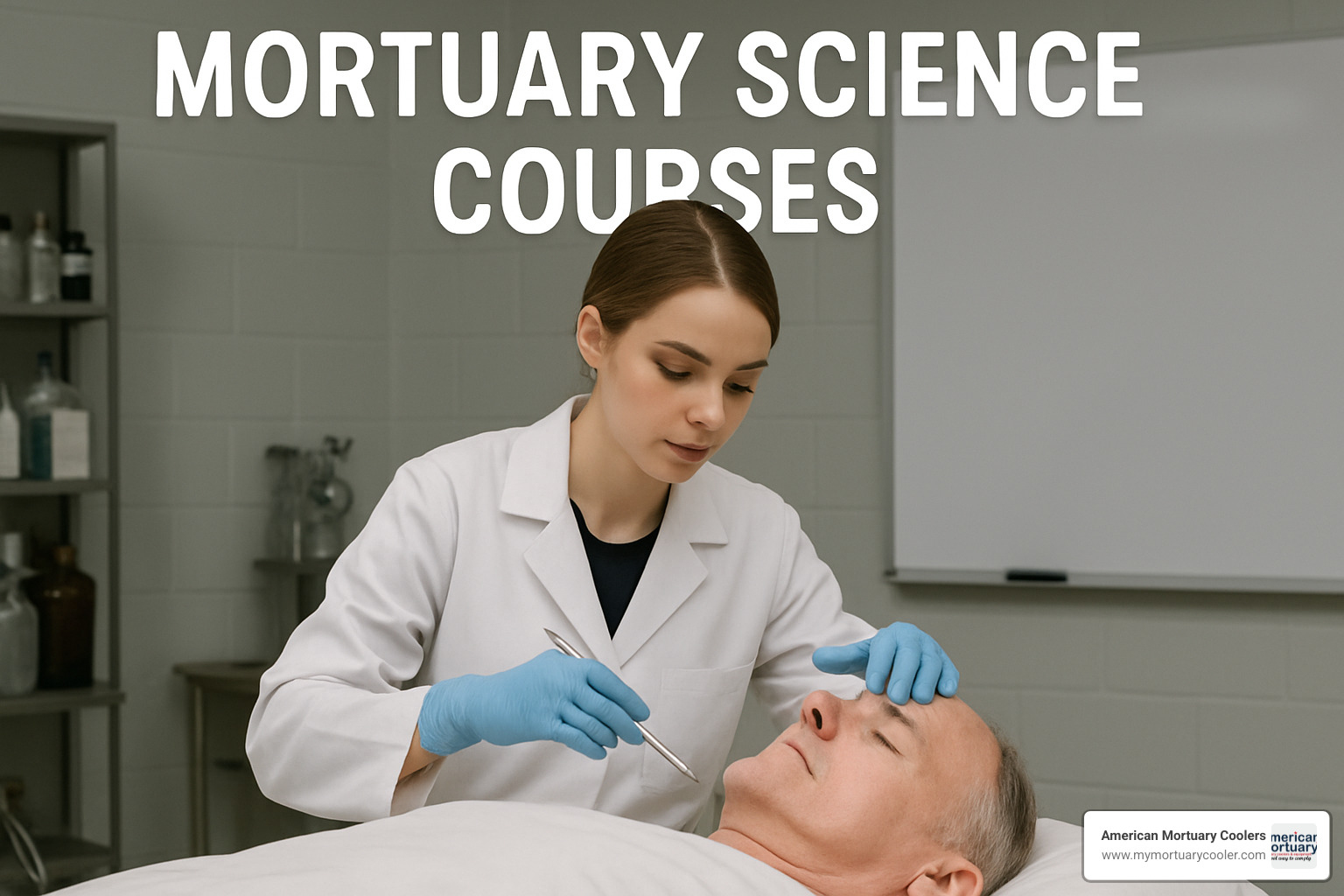
ABFSE accreditation opens doors in ways that matter for your career. State licensing boards recognize these programs, which means you can actually get licensed after graduation. You'll also qualify for federal financial aid - a huge help when managing education costs. Plus, if you ever want to transfer credits or continue your education, accredited programs make that process much smoother.
But here's something important: regional accreditation matters too. This broader educational accreditation ensures the entire institution meets quality standards. Programs accredited by organizations like the Northwest Commission on College and Universities give you extra confidence and better credit transfer options.
Before you enroll anywhere, double-check both types of accreditation. It might seem like paperwork, but attending a non-accredited program can create serious problems. You might struggle to get licensed, face limited job opportunities, or find your credits won't transfer if you want to continue your education elsewhere.
State licensing requirements build on this foundation. Most states require graduation from an ABFSE-accredited program plus hands-on internship experience. Washington state, for example, requires 1,800 hours of supervised training under a licensed funeral director. Without proper accreditation, you can't even start this licensing process.
The bottom line? Accreditation protects your investment in education and your future career prospects. It's worth taking the time to verify before you commit to any program.
Preparing for the National Board Examination
The National Board Examination represents the final hurdle between mortuary science students and their professional careers. After completing comprehensive mortuary science courses, students must demonstrate their mastery through these rigorous national assessments.
The examination consists of two distinct components that test different aspects of funeral service knowledge. The Arts section evaluates students' understanding of funeral service practices, regulations, and professional skills - essentially everything they need to know about working with families and managing funeral operations. The Sciences section focuses on the technical foundation, covering anatomy, chemistry, microbiology, and pathology.
Pass rates vary significantly between programs, which makes choosing the right school crucial for your success. Chandler-Gilbert Community College, for example, reported 68% pass rates for Arts and 65% for Sciences in 2022. These numbers align closely with national averages of 69% and 65% respectively, but some programs perform much better or worse than these benchmarks.
The most successful students don't wait until graduation to start preparing. Effective preparation begins early in the program through comprehensive review of all coursework, regular practice examinations, and active participation in study groups. Many students find that hands-on laboratory review helps reinforce theoretical concepts, while professional mentorship provides valuable guidance on test-taking strategies.
Time management and test-taking skills often make the difference between passing and failing. The pressure of these high-stakes examinations can overwhelm even well-prepared students, so developing confidence through mock examinations and practice sessions is essential.
Quality programs integrate National Board preparation throughout their curriculum rather than cramming everything into final review sessions. Regular assessments help identify knowledge gaps early, while comprehensive reviews ensure students retain information from earlier courses.
The practical experience gained through internships and practicum courses provides real-world context that improves examination performance. Students who complete extensive hands-on training typically demonstrate better understanding of how theoretical knowledge applies to actual funeral service work, which translates to improved scores on both components of the National Board Examination.
Ethical Considerations and Professional Standards
Working in mortuary science means carrying tremendous responsibility. Ethical standards in mortuary science courses prepare students for the sacred trust families place in funeral service professionals.
"Ethical Practice Statement"
Confidentiality stands as the most critical principle. Families share deeply personal information that must remain private. Respect for the deceased means treating every person with care and maintaining professional behavior during all procedures.
Legal compliance goes beyond following regulations - it's about understanding that laws protect families during vulnerable times. Professional behavior means putting family needs above profit motives through honest pricing and clear communication.
Cultural sensitivity has become increasingly important as communities grow more diverse. Students learn to adapt services for different religious practices and cultural traditions, whether Jewish burial customs, Hindu cremation practices, or military honors.
These ethical principles are woven throughout every aspect of mortuary science courses, with students practicing ethical decision-making in labs, directing scenarios, and business exercises until ethical behavior becomes second nature.
Practical Components: Embalming and Restorative Art Training
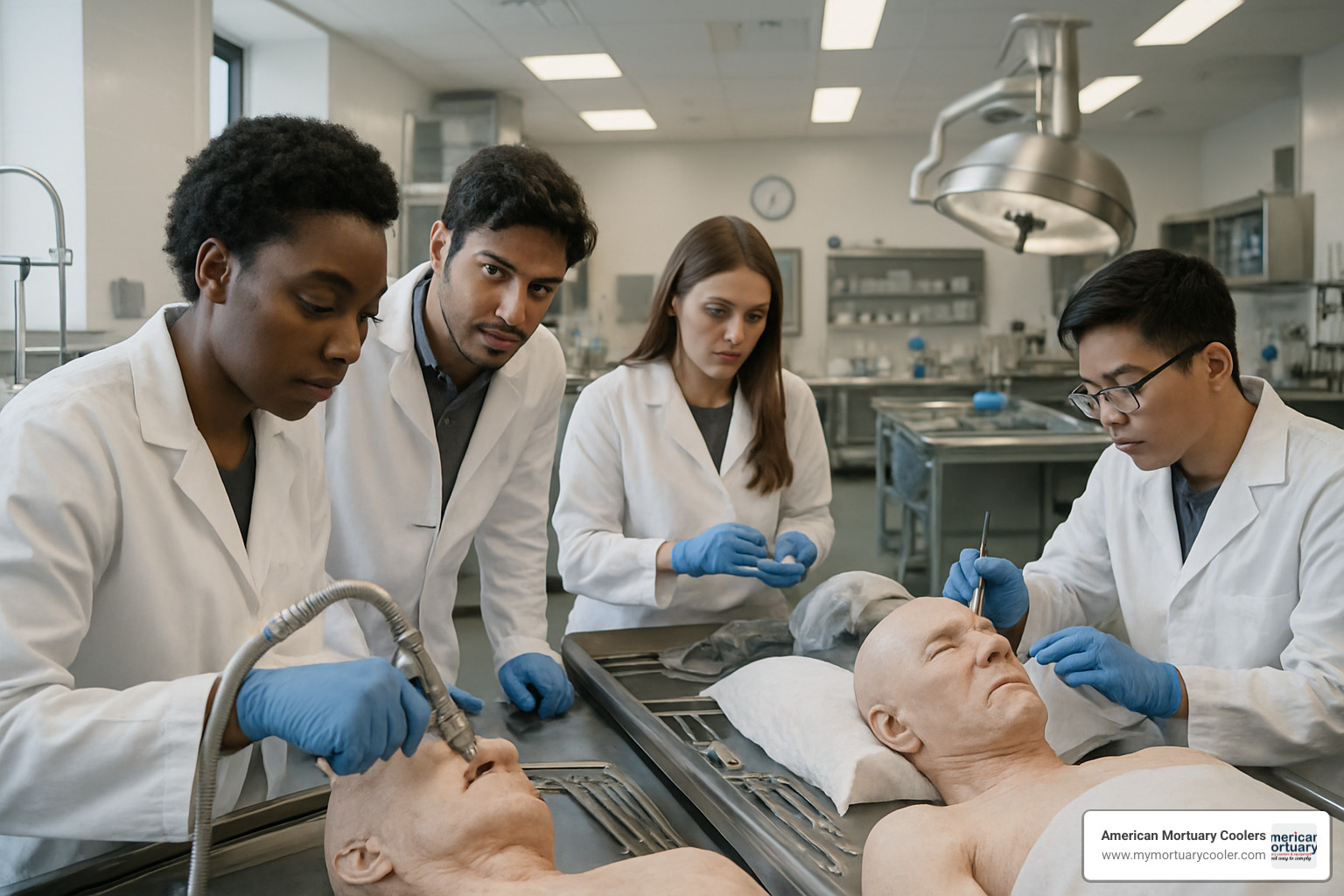
Hands-on training transforms classroom theory into real-world skills. Students learn embalming procedures on donated bodies under close supervision, mastering injection techniques and chemical application.
Restorative art techniques require both scientific knowledge and artistic ability. Students practice cosmetic application and hair styling to restore natural appearance through careful color matching.
The preparation room becomes a second classroom where students master equipment operation, ventilation systems, and specialized tools. Proper sanitation and safety protocols become automatic habits.
Most programs require specific case completions, with students gradually taking more responsibility. Case documentation teaches administrative requirements for legal compliance.
Clinical partnerships with hospitals and funeral homes provide real-world experience with challenging cases requiring creative solutions and professional judgment.
Skills developed through practical training:
- Technical embalming procedures and chemical application
- Cosmetic restoration and hair styling techniques
- Professional communication with families and colleagues
- Time management and case prioritization
- Problem-solving for challenging cases
- Sanitation and safety protocol implementation
Incorporating Business and Management Skills
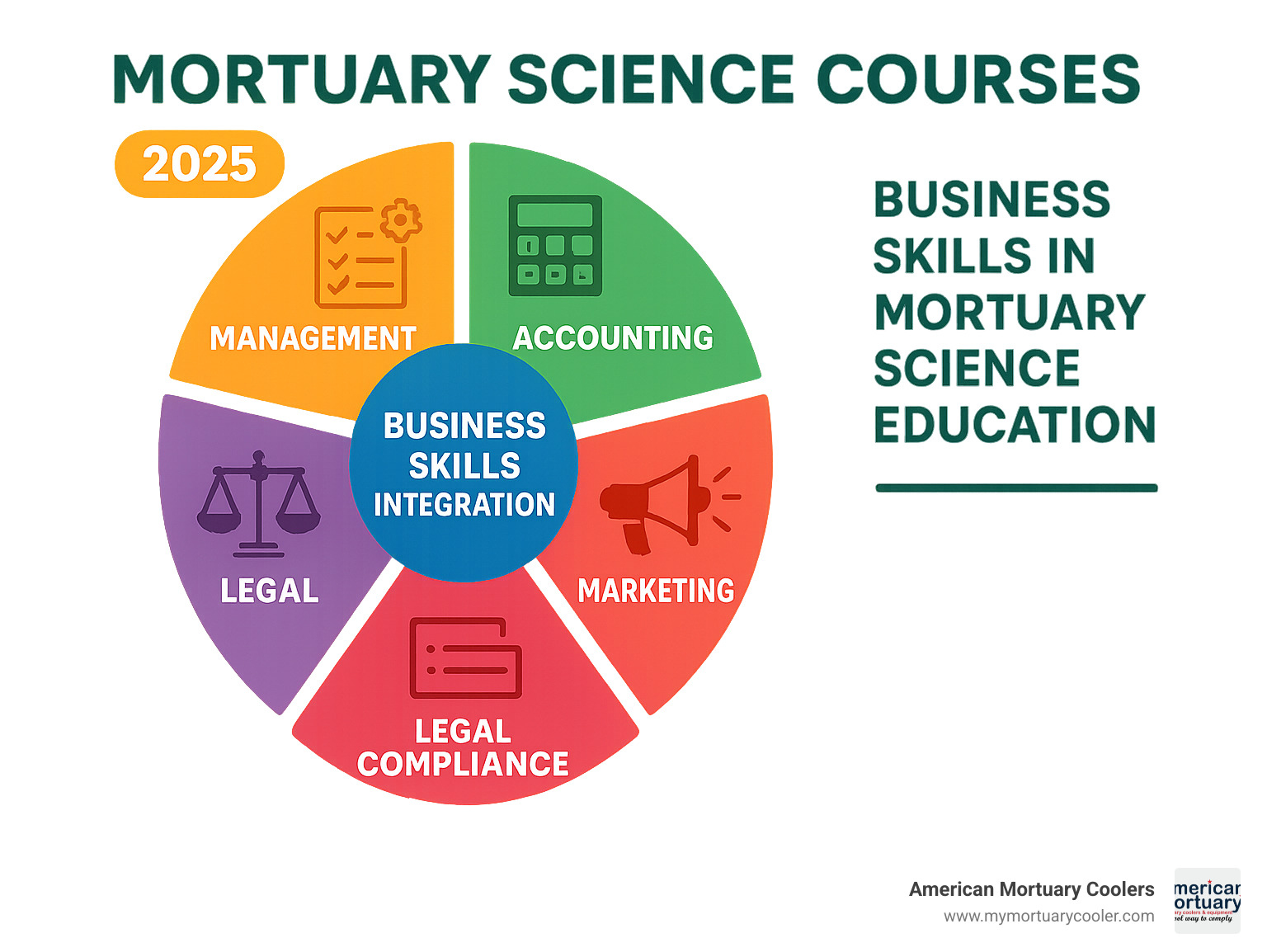
Modern funeral service operates as both a caring profession and business enterprise. Mortuary science courses emphasize business skills essential for career success and funeral home operations.
Accounting and financial management courses teach bookkeeping, financial statements, and cost analysis. These skills help funeral homes stay sustainable while serving communities.
Marketing and sales training covers ethical promotion and community relationship building. Pre-need marketing helps families plan ahead and reduces stress during difficult times.
Small business management addresses daily operations including staff supervision, inventory management, and facility maintenance. Since many graduates eventually own funeral homes, these skills become crucial.
Legal compliance training covers Federal Trade Commission requirements, state regulations, and consumer protection laws. Students learn that compliance protects families and maintains professional standards.
Customer service excellence focuses on caring for families during difficult moments, including handling complaints and maintaining service quality. The integration of business skills shows students that ethical practices and compassionate care work together.
Career Opportunities for Mortuary Science Graduates
Mortuary science courses open doors to meaningful careers that combine technical expertise with compassionate service. The death care industry offers diverse opportunities with excellent job security - something not many fields can promise these days.
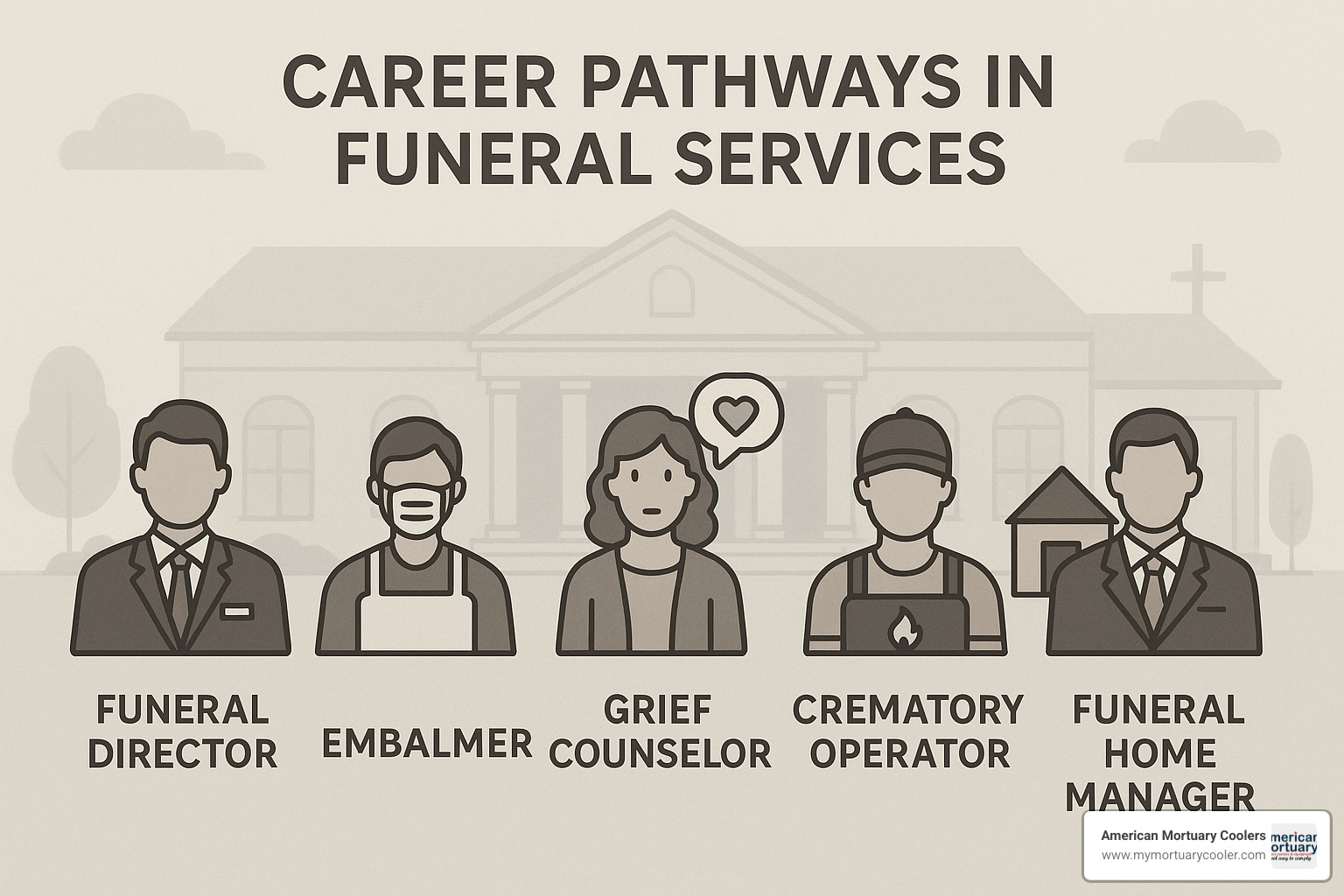
The most common career path is becoming a funeral director, where you'll coordinate services, guide families through difficult decisions, and handle all the logistics that make funerals meaningful. It's demanding work, but incredibly rewarding when you help families honor their loved ones properly.
Embalmers focus on the technical side - body preparation, preservation, and restoration. Many embalmers enjoy the specialized nature of this work and often serve multiple funeral homes in their area. The skill level required means experienced embalmers are always in demand.
Funeral service managers oversee daily operations, supervise staff, and handle the business side of funeral homes. This role often leads to ownership opportunities for those with entrepreneurial spirits. Many successful funeral home owners started as managers who learned the business inside and out.
The salary potential is quite reasonable, ranging from $26,000 for entry-level positions to $126,000 for experienced professionals. The average sits around $53,000, which provides a comfortable living in most communities. What's really impressive is the 100% employment rate reported by many programs - try finding that guarantee in other fields!
Beyond traditional roles, the industry is evolving with new opportunities. Crematory operations are growing rapidly as more families choose cremation. Pet funeral services represent an emerging market that many funeral professionals are exploring. Green burial and alternative disposition methods appeal to environmentally conscious consumers.
Some graduates find their calling in grief counseling and bereavement support, using their mortuary science background to help families through the healing process. Others work with forensic death investigation teams or mass casualty response units, applying their skills in challenging circumstances.
The beauty of this field is its geographic flexibility. Every community needs funeral services, so you can often find work wherever you want to live. Rural areas sometimes offer more immediate opportunities, while urban markets may provide higher salaries and specialized positions.
What really sets this career apart is the job security. People will always need these services, and the relatively small number of graduates compared to available positions means qualified professionals stay in demand. It's one of those rare careers where you can make a real difference in people's lives while building a stable future for yourself.
Transfer and Further Education Opportunities
Mortuary science courses open doors to educational pathways beyond initial degrees. Credit transfer is straightforward for most accredited programs through regional systems.
Typical paths involve completing 9-12 courses at community colleges before transferring to specialized programs. About 25% of students entering mortuary science already hold bachelor's degrees, showing the value of advanced education.
Bachelor's degree programs offer deeper business courses, research methods, and specialized electives. The University of Minnesota's program, established in 1908, demonstrates the academic rigor possible in this field.
Many graduates pursue master's degrees in thanatology, grief counseling, or business administration. Public health degrees are becoming popular for regulatory work.
Before transferring, research transfer agreements between schools. Our guide Your Path to Becoming a Funeral Director provides detailed educational planning information.
Mortuary science education offers flexibility whether you're starting out or advancing an existing career.
Frequently Asked Questions about Mortuary Science Courses
What are the prerequisites for enrolling in mortuary science courses?
A high school diploma or GED serves as the foundation for most programs. Many schools prefer students with some college coursework in English, mathematics, and basic sciences. Some programs require prerequisite courses like anatomy, chemistry, or psychology.
Most schools offer assessment testing to determine college readiness. Age requirements typically require students to be at least 18 years old for hands-on laboratory work.
Can I take mortuary science courses online?
Yes - with important caveats. Currently, 43 accredited programs offer distance education options, with some providing more than half their curriculum online.
However, every program requires hands-on laboratory work that cannot be done remotely. You'll need practical training on-campus for embalming procedures and restorative art techniques.
Verify that your chosen program is authorized in your state and meets licensing requirements before enrolling.
What is the job outlook for mortuary science graduates?
The job outlook is excellent - many programs report 100% employment rates with 95% finding work in funeral service. Salary potential ranges from $26,000 for entry-level to $126,000 for experienced professionals, with an average around $53,000.
The aging population ensures consistent demand while relatively few people choose this career path, creating favorable supply-and-demand conditions. Career advancement opportunities include management roles, specialized services, and funeral home ownership.
Conclusion
Choosing the right mortuary science courses can transform your passion for helping others into a meaningful career that truly makes a difference. Throughout this comprehensive guide, we've explored how these specialized programs blend technical expertise with compassionate care, preparing you for the unique challenges and rewards of funeral service.
The beauty of modern mortuary science education lies in its flexibility and accessibility. Whether you thrive in traditional classroom settings, prefer the convenience of online learning, or need a hybrid approach that fits your busy schedule, accredited programs are designed to meet you where you are. The most important factor isn't how you learn—it's ensuring your chosen program carries proper ABFSE accreditation and meets your state's licensing requirements.
This field offers something rare in today's job market: genuine job security combined with meaningful work. With employment rates reaching 100% in many programs and salaries ranging from entry-level positions to six-figure management roles, you're investing in a stable future while serving your community's most essential needs.
The comprehensive curriculum we've discussed—from embalming and restorative art to business management and grief counseling—reflects the evolving nature of funeral service. Today's professionals need both technical skills and business acumen to succeed in an industry that's becoming increasingly sophisticated while maintaining its core mission of compassionate care.
As you take your next steps, Explore Affordable Online Funeral Director Programs offers valuable insights for program selection and career planning. The journey ahead requires dedication and study, but it leads to a profession where you'll help families steer their most difficult moments with dignity and grace.
At American Mortuary Coolers, we've had the privilege of supporting funeral service professionals and educational institutions across the country for years. From our Tennessee headquarters, we provide custom mortuary equipment solutions that help maintain the highest standards of care and professionalism. We understand the dedication and skill that mortuary science courses develop in students, and we're honored to support the industry through quality equipment and reliable service to all 48 contiguous states.
Your decision to pursue mortuary science education represents more than career training—it's a commitment to serving others when they need it most. That's a calling worth pursuing, and one that will reward you with purpose, stability, and the deep satisfaction that comes from making a real difference in people's lives.



















